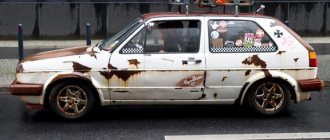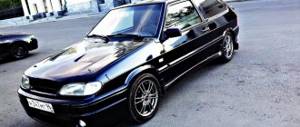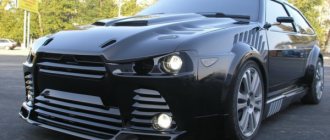Activity
The company owns a number of automobile factories in South Korea (including the world's largest automobile assembly plant in Ulsan), Turkey, North America, China, and India. In March 2006, the construction of a plant in the Czech Republic was announced.
The company's cars are sold in 5,000 car dealerships around the world. Official slogan
.
The company's sales in 2007 amounted to 2,324,778 vehicles, 624,227 of which were sold in the domestic market and 1,700,551 in foreign markets. Revenue for this period amounted to $74.2 billion, net profit — $1.7 billion. [1]
Hyundai Motor in Russia
In Russia, the assembly of Hyundai passenger cars of the Accent and Sonata brands, as well as Porter light trucks, is carried out in Taganrog at the TAGAZ plant. In 2007, the plant will produce, according to its own data, 80 thousand cars. [2]
In December 2007, an agreement was signed on the upcoming construction of a Hyundai plant in Russia. The capacity of the new enterprise, which will be located in St. Petersburg, in the Kamenka industrial zone, will be 100 thousand cars per year, the investment volume will be $400 million. Construction will begin in the summer of 2008. [2] It is also expected that, together with the automobile plant in St. Petersburg, a plant for the production of Hyundai Mobis auto components will be launched [3].
Sales of Hyundai cars in Russia in 2007 amounted to 147,843 units. [1]
What's the rule
"Hyundai" is an incorrect but widely used colloquial name for a Korean-made car brand.
How to spell Hyundai in English?
In English letters this word is written like this: hyundai. The confusion over pronunciation and spelling arose because the combination of the letters "a" and "i" is pronounced "e" in Korean, but customers naturally read the name in English. This is how the syllable “ay” appeared.
“Hyundai” is another incorrect pronunciation and spelling, arose due to differences in the meaning of the syllable hyun.
“Hyundae” - this spelling of this word most accurately conveys the Korean pronunciation. The system for transmitting Korean words was developed by Soviet linguist Alexander Kholodovich.
Hyundai Hyundai or Hyundai
The borrowed word "Hyundai" requires memorization. It is not easy to write it correctly.
Hyundai cars
Model range of Hyundai cars presented in Russia
Cars
- Hyundai Getz
- Hyundai Accent
- Hyundai Verna
- Hyundai Elantra
- Hyundai i30
- Hyundai Sonata
- Hyundai NF (Hyundai Sonata fourth generation)
- Hyundai Coupe
- Hyundai Grandeur
Minivans, SUVs
- Hyundai Matrix
- Hyundai Trajet
- Hyundai H-100
- Hyundai Tucson
- Hyundai Santa Fe
- Hyundai ix55
Commercial
- Hyundai Porter
- Hyundai County
- Hyundai HD-72
Model range of Hyundai Motor cars
- Hyundai Atos Van 1.0i Van
- Hyundai Excel 1.3i Van
- Hyundai Excel 1.5i Van
- Hyundai Elantra 1.5i Van
- Hyundai Elantra 1.6i Van
- Hyundai Elantra 1.9D Van
- Hyundai Galloper Van 2.5 TD
- Hyundai Galloper Van 2.5 TDi
- Hyundai Galloper Van 3.0 V6
- Hyundai Highway 2.0 CRDi
- Hyundai Highway 2.7i Van
- Hyundai Santa Fe 2.0i Van
- Hyundai Santa Fe 2.4i Van
- Hyundai Santa Fe 2.7i Van
- Hyundai Santa Fe 2.0 CRDi
- Hyundai Terracan 2.9 CRDi
- Hyundai H100 Van 2.5 TD
- Hyundai H100 Pickup 2.5 TD
- Hyundai H150 Pickup 2.5 TD
- Hyundai H200 2.4i
- Hyundai H200 2.5 TD
- Hyundai H200 2.5TCi
- Hyundai HD65 3.3 TD
- Hyundai HD65 3.6D
- Hyundai HD65 3.9 TDi
- Hyundai HD72 3.3 TD
- Hyundai HD72 3.9 TDi
- Hyundai HD120 7.5 TDi
- Hyundai HD120 7.5D
- Hyundai HD160 Truck
- Hyundai HD170 Truck
- Hyundai HD250 Truck
- Hyundai HD260 Truck
- Hyundai HD270 Mixer
- Hyundai HD270 Dump
- Hyundai HD310 Truck
- Hyundai HD320 Truck
- Hyundai HD370 Dumper
- Hyundai HD380 Mixer
- Hyundai HD390 Tractor
- Hyundai HD540 Tractor
- Hyundai HD700 Tractor
- Hyundai HD900 Tractor
Hyundai Tiburon GK 2.7 “Tibus II” › Logbook › Which is correct: “Hyundai”, “Hyundai” or “Hyundai”?
Looking at text written in Korean, you and I might think that the coding in Word has gone crazy or that the computer has been taken over by aliens. But people who know the Korean language see the letters that make up words. It is letters, not hieroglyphs, that are a very important fact, which ultimately explains all the problems associated with Korean words.
The history of the life of Korean words in the Russian language is full of truly Shakespearean drama. Until about the middle of the twentieth century, the situation was completely sad: there were (and still are) many different dialects, there were few professional translators and Korean historians, and there was no scientific standardized system for transmitting Korean names and titles at all. This resulted in terrible confusion and variability in the transmission of certain names and titles. For example, such a well-known surname in Russia as Tsoi can be pronounced both as Tskhoi, and generally as Choi. And the famous North Korean leader Kim Il Sung is actually Kim Il-sung. Not bad, right?
In the middle of the last century, Alexander Alekseevich Kholodovich, a respected Soviet linguist and orientalist, undertook to correct the situation. For Korean scholars, Kholodovich, in fact, played the same role as Polivanov, already known to us, for Japanese scholars, namely, he finally brought order and developed a system for writing Korean words in Russian. Later, on its basis, a Russian-Korean practical transcription was formed, in the development of which linguists such as Lev Rafailovich Kontsevich and Yuri Nikolaevich Mazur took an important part (in case you are seriously interested in this topic, you simply need to know all these names).
We will not go into detail about the patterns of transmission of Korean words in Russian - believe me, this is not the case when everything can be explained easily in two paragraphs. It is important to know that after the appearance of the system, everything more or less really settled down... until the English language intervened (this reminds us of something). How? It's simple. At the end of the last century, South Korean companies began to vigorously and confidently enter the world market, bombing the planet with washing machines, VCRs and cars. Well, to take over the world you can’t do without the “international” English language, which is why Korean names were dubbed into English.
This is where the catch lies! Now the main thing is not to get confused: Kholodovich and his colleagues proposed a system for transmitting more or less accurate pronunciation of Korean words in Russian. But the system adopted for the English language was tailored to convey the spelling of a Korean word, letter by letter - the alphabet, as we said at the very beginning, is in the Korean language! That is, for the English language they simply took and transliterated the Korean name, one letter after another, and got the word Hyundai. It just doesn't read the way it is written. Our expert today, translator and journalist Alena Packer, will explain in more detail. The name of the Hyundai corporation, of course, correctly sounds like “Hyundai”. The incorrect pronunciation, oddly enough, came from the company itself when it entered the Russian market. It is very important to note that it is the pronunciation that is incorrect, not the spelling of the word Hyundai. The fact is that in the Korean language there are diphthongs (complex two-vowel sounds). The logic of constructing a diphthong is not always easy to understand. This is exactly the diphthong “e” at the end of the word “Hyundai”. It is read as “e”, but consists and is written of two vowels “a” and “y”. Thus, today we have “Hyundai”, not “Hyundai”. A few years later, after the company had achieved success in the Russian market (and in the world), the company’s management suddenly realized that the ending of the name – “dai” (consonant with die, that is, “to die” in English) – was not very fits in with the automobile business. And Hyundai began the project “Anneng Hyundai” (안녕 현대) to correct the pronunciation of its name with the participation of Korean students around the world. (Alena Packer, translator, journalist)
Hydrogen fuel cell transport
By the end of 2006, Hyundai had produced 10 cars and buses powered by hydrogen fuel cells. Hyundai Motor plans to begin selling the fuel cell-powered Tucson SUV by 2010.
Two Tucson FCEVs and a hydrogen fuel cell bus are being tested in California. Fuel cells manufactured by UTC Power (USA).
In the summer of 2006, during the FIFA World Cup, a Hyundai hydrogen fuel cell hybrid bus transported tourists from Tegel Airport to the Olympic Stadium in Berlin. Fuel cell power 160 kW. The range on one fill is 300 km.
The South Korean government plans to invest 48 billion won ($51.7 million) by 2008 in the development of buses and fuel cell cars. In 2007, testing of 14 Hyundai-Kia vehicles will begin. Nine fuel cell vehicles will be produced in 2007, and another 20 in 2008.
Spelled correctly
Many brands are faced with the fact that when exporting to different countries around the world, they often have to adapt their names and make them more understandable and easy to pronounce for people who do not speak the original languages. Some brands even had to be renamed because their names sounded stupid, inappropriate, or sometimes even vulgar in other languages. One of the companies that also faced difficulties in moving to the European and American markets was the Korean company Hyundai. Now among Russian-speaking citizens, disputes often arise about how to spell Hyundai or Hyundai. But the truth is that both of these spellings will be incorrect.
see also
- Hyundai buses
- Model range of Hyundai passenger cars
- Model range of Hyundai trucks
| Hyundai Motor Company cars | |
| Current models: | Accent | Coupé | Equus | Elantra | Entourage | Grandeur | H-1 | i10 | i20 | i30 | ix55 | Matrix | Santa Fe | Sonata | Tucson | |
| Historical models: | Atos | Galloper | Getz | Lantra | Pony | Stellar | Terracan | Trajet | XG | |
| Hyundai Motor Company | |
| Hyundai cars | Atoz/Atos • Visto/Atos Prime/Santro • Pony • Excel/Presto • Accent/Pony/Excel/Verna • Click/Getz/TB • i20 • Avante/Elantra • Scoupe • Cortina • Stellar • Sonata/NF • Marcia • Tiburon /Coupe • Tuscani/Tiburon/Coupe • Grandeur • XG/Grandeur • Grandeur/Azera • Genesis • Ford 20M • Dynasty • Equus/Centennial • Lavita/Matrix • Tucson/JM • Santa Fe • Terracan • Galloper • Santamo • Trajet • Starex /H-1/Satellite • Grace/H100/Satellite • Porter/H100 • Libero/H-1 • HD 1000 • Entourage • Veracruz |
| Based on Ford and D Series • DK Series • R Series • O303 Benz Bus • HD 160 • HD 170 | |
| Based on Mitsubishi Fuso | Mighty • Chorus • 4.5 to 5-ton truck • 8 to 25-ton truck • Aero City • Aero • RB Series • FB Series • DQ-7 • Bison |
| Based on Hyundai | Mighty • Mighty II • e-Mighty • Chorus • County (e-County) • 4.5 to 5 ton truck • Super Truck Medium • Mega Truck • Aero Town (e-Aero Town) • 8 to 25-ton truck • Super Truck • New Power Truck • Aero City • Global 900 • Aero • Universe • Trago |
| Official site | |
Hyundai is a Hyundai, a Hyundai or a Hyundai? What is the correct way to say it?
Well, to take over the world you can’t do without the “international” English language, which is why Korean names were dubbed into English.
This is where the catch lies!
Now the main thing is not to get confused: Kholodovich and his colleagues proposed a system for transmitting more or less accurate pronunciation of Korean words in Russian. But the system adopted for the English language was tailored to convey the spelling of a Korean word, letter by letter - the alphabet, as we said at the very beginning, is in the Korean language! That is, for the English language they simply took and transliterated the Korean name, one letter after another, and got the word Hyundai.
It just doesn't read the way it is written. At this point, it’s not the Japanese who start throwing up, but ordinary lovers of rice and fish.
The same Polivanov system, adopted last year and still not rejected, speaks quite clearly about “ts” and “ts”. But we have, and therefore it’s correct “Mitsubishi”. Therefore, the Russian office option is twice as puzzling.
It seems to me that the Hyundai option would be the best, although the Hyundai option is very often used, which seems to me not the most euphonious. Finally, the Hyundai option also has a right to exist, but I haven’t heard it often, which doesn’t mean anything.
They say that this pronunciation most closely matches the pronunciation in the original language. But you shouldn’t write it in Russian letters. That is, for the English language they simply took and transliterated the Korean name, one letter after another, and got the word Hyundai.
It just doesn't read the way it is written. Translator and journalist Alena Packer: The incorrect pronunciation came, oddly enough, from the company itself when it entered the Russian market.










